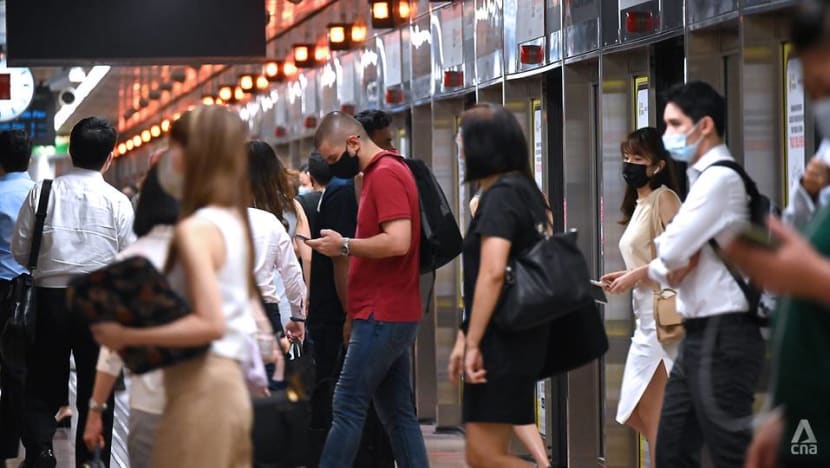CNA Explains: What you need to know about the upcoming increase in bus and train fares
How much more will commuters have to pay for bus and MRT rides? Will fares for students and the elderly go up? And what are the reasons for raising fares?

SINGAPORE: Public transport fares will increase by up to 5 cents from Dec 26 as operators continue to grapple with rising energy prices.
In its annual fare review exercise, the Public Transport Council (PTC) said it would increase fares by 2.9 per cent, after taking into account the need to keep fares affordable for the public while ensuring that the system remains financially sustainable.
Here’s what you need to know about the fare increases.
ADULT COMMUTERS
From Dec 26, adult card fares will increase by 4 cents for journeys of up to 8.2km. For journeys longer than 8.2km, fares will increase by 5 cents.
This means that an MRT journey from Boon Lay to Clementi, where the distance is 8.2km, will be S$1.45 for adult commuters, up from S$1.41 currently.
Taking the MRT from HarbourFront to Paya Lebar, which covers a distance of 11.5km, will cost S$1.64, up from S$1.59.
STUDENTS, SENIOR CITIZENS AND PEOPLE WITH DISABILITIES
Students and senior citizens holding concession cards will also see a rise in public transport fares. However, the increase will be capped at 1 cent per journey.
This will also extend to concession card fares for low-wage workers and people with disabilities. Introduced in 2014, these schemes are funded by the Government.
Low-wage workers will continue to get discounts of up to 25 per cent off adult fares.
Meanwhile, fares for commuters with disabilities will continue to be pegged to that of seniors, which is a discount of up to 55 per cent off adult fares.
CASH FARES, MONTHLY CONCESSION OR TRAVEL PASS USERS
Prices of monthly concession passes and adult monthly travel passes will remain unchanged.
A hybrid monthly concession pass for primary school students currently costs S$43.50, while that for secondary and polytechnic students is S$54. University students and full-time national servicemen pay S$90.50.
Senior citizens pay S$64 while monthly travel passes for adults cost S$128.
Bus cash fares will also remain unchanged for the third year in a row since 2019.
TRANSPORT VOUCHERS FOR LOW-INCOME HOUSEHOLDS
A total of 600,000 public transport vouchers worth S$30 each will be given to lower-income households to help them cope with the increase in bus and train fares.
The vouchers can be used to top up fare cards or buy monthly concession passes and must be redeemed by Mar 31, 2024.
Only resident households with a monthly household income per person of not more than S$1,600 will be eligible for the vouchers.
The disbursement of the vouchers will be done in two stages, starting end-December.
In the first stage, eligible households that received the vouchers in the previous year’s public transport voucher exercise will automatically receive a notification letter through the mail, without having to apply.
From early 2023, households that meet the income criteria but did not receive a voucher in the first stage will be able to apply for them online or in person at their local community centres or community clubs.
WHY ARE FARES GOING UP?
The fare hike is necessary to meet rising energy prices, which rose by 117 per cent last year, said the PTC. It also noted increased manpower costs and inflation.
These factors would have allowed for a maximum fare increase of 13.5 per cent under the current fare adjustment formula - the highest quantum since the formula was implemented in 2005.
Both transport operators had applied for a fare adjustment of 13.5 per cent, citing escalating costs as among the reasons.
After taking into account government support for COVID-19 in their latest financial year, SBS Transit’s train segment reported a loss of tens of millions of dollars while SMRT Trains recorded an operating profit of S$16 million.
However, the PTC said it decided to grant public transport operators a fare increase of just 2.9 per cent due to concerns over the rising cost of living. The remaining 10.6 per cent will be carried over to future fare review exercises.
While the fare increase will generate additional revenue of about S$50.3 million a year, PTC said this will not be enough to cover the costs of operating high-quality public transport services.
To cover the increased costs and shield commuters from the brunt of the fare increases, the Government will provide an additional S$200 million in subsidies in 2023. This is on top of the current subsidies of more than S$2 billion per year to run bus and train services.
















